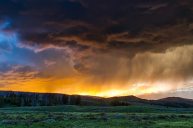Believe it or not, there was a time when almost all life was wiped out on earth. And no we're not talking about the dinosaurs. A weather phenomenon once nearly killed 90% of all life on Earth. It's a startling but groundbreaking discovery for scientists.
In a new study, researchers delved into the distant past. They learned a weather phenomenon wiped out as much as 90% of all life on the planet. It happened around 250 million years ago. The weather phenomenon led to such devastation that it dwarfed the killing of the dinosaurs. Published in the journal Science, researchers from the UK's University of Bristol and China University of Geosciences (Wuhan) dove into the subject. They believe El Niños once caused a devastating climate crisis. It led to much of the world's forests to be killed off.
Weather Phenomenon Killed Life
El Niños are weather phenomena that cause the ocean surfaces to suddenly and drastically heat up. Typically, they happened in the Pacific Ocean. Weather experts declare an El Niño when the ocean rises 0.5 °C above the average. Experts call this major event the 'Great Dying.' It's the worst mass extinction ever. While volcanic activity played a role, they believe the weather played a larger role.
China University of Geosciences' Professor Yadong Sun opened up about the new findings. He said, "Most life failed to adapt to these conditions, but thankfully a few things survived, without which we wouldn't be here today. It was nearly, but not quite, the end of life on Earth."
Meanwhile, Dr Alexander Farnsworth, from the University of Bristol, added, "Climate warming alone cannot drive such devastating extinctions because, as we are seeing today, when the tropics become too hot, species migrate to the cooler, higher latitudes. Our research has revealed that increased greenhouse gases don't just make the majority of the planet warmer, they also increase weather and climate variability making it even more 'wild' and difficult for life to survive."
However, researchers say there is a lot of uncertainty around the actual event. They said that there's more research to be had.




